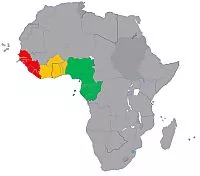Who
Ijaw chiefs Douglas Jaja, Wellington Okirika; Government "Tompolo" Ekpemupolo, former militant kingpin of the Movement for the Emancipation of the Niger Delta (MEND), Transport Minister Rotimi Amaechi; Former President Goodluck Jonathan; Niger Delta Avengers, a militant group in the Niger Delta; Chief Edwin Clark, an influential elder in the Niger Delta.
What, Why & When
Traditional Ijaw chiefs in the Niger Delta have met Oil Minister Ibe Kachikwu freshly to discuss conditions for peace. This happened a week after militant group Niger Delta Avengers announced that it would halt attacks pending an anticipated dialogue between the Nigerian government and local leaders in the region led by Edwin Clark.
On August 25, six Ijaw chiefs led by Douglas Jaja and Wellington Okirika visited Kachikwu independently to discuss the militancy in parts of the region. The visit wasn't endorsed by Edwin Clark, but the chiefs—also influential in their own domains—told Kachikwu they want the army to release youths picked up in their communities for alleged militancy.
The army invaded Ijaw communities in May and arrested dozens of young people believed to be militants. The community residents said those arrested weren't militants but ordinary young people, some of them students. Most of those arrested have been in army custody since then without trial.
The chiefs also want the controversial Nigerian Maritime University completed. Former president Goodluck Jonathan established the university two years ago in the Ijaw town of Okerenkoko, and former militant kingpin Tompolo was instrumental to its establishment. But when Rotimi Amaechi, who opposes Jonathan, became transport minister and the university came under his charge, he scrapped the university saying it was unnecessary and overly expensive. This antagonised many Ijaw leaders and sparked youth protests, and some believe this contributed to the upsurge in militancy this year.
Outlook
Amaechi and Kachikwu openly disagreed about the maritime university during a town hall meeting earlier this year. Unlike Amaechi, Kachikwu wants the university to work and has asked Amaechi to transfer the project to his own ministry if he's concerned about the cost. This controversial university will likely be a key bargaining chip in peace talks going forward. In the interim, our security risk rating remains high and more militant attacks on oil facilities in the region are likely.
The content of this article is intended to provide a general guide to the subject matter. Specialist advice should be sought about your specific circumstances.


